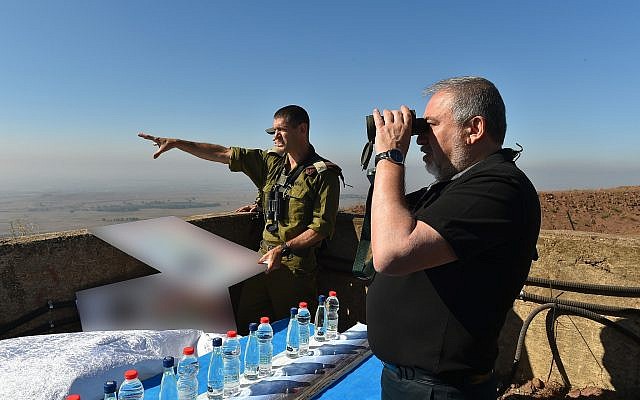
Liberman: Pro-Iranian forces setting up ‘terror infrastructure’ in Syrian Golan
On tour of the northern border, defense minister warns that Assad regime troops who enter demilitarized zone are ‘endangering their own lives’
Defense Minister Avigdor Liberman on Tuesday said Israel has detected efforts by Iran-backed terror groups to establish infrastructure in southwestern Syria, under the cover of dictator Bashar Assad’s renewed offensive against two rebel-held provinces in the area.
“We are seeing efforts by figures associated with the [Iran-led] axis, with permission from the regime, to establish terrorist infrastructure here in the Syrian Golan Heights,” Liberman said during a tour of the border with Syria.
Liberman would not elaborate on the nature of the “terrorist infrastructure,” but reiterated that Israel was holding Syria responsible for it as well.
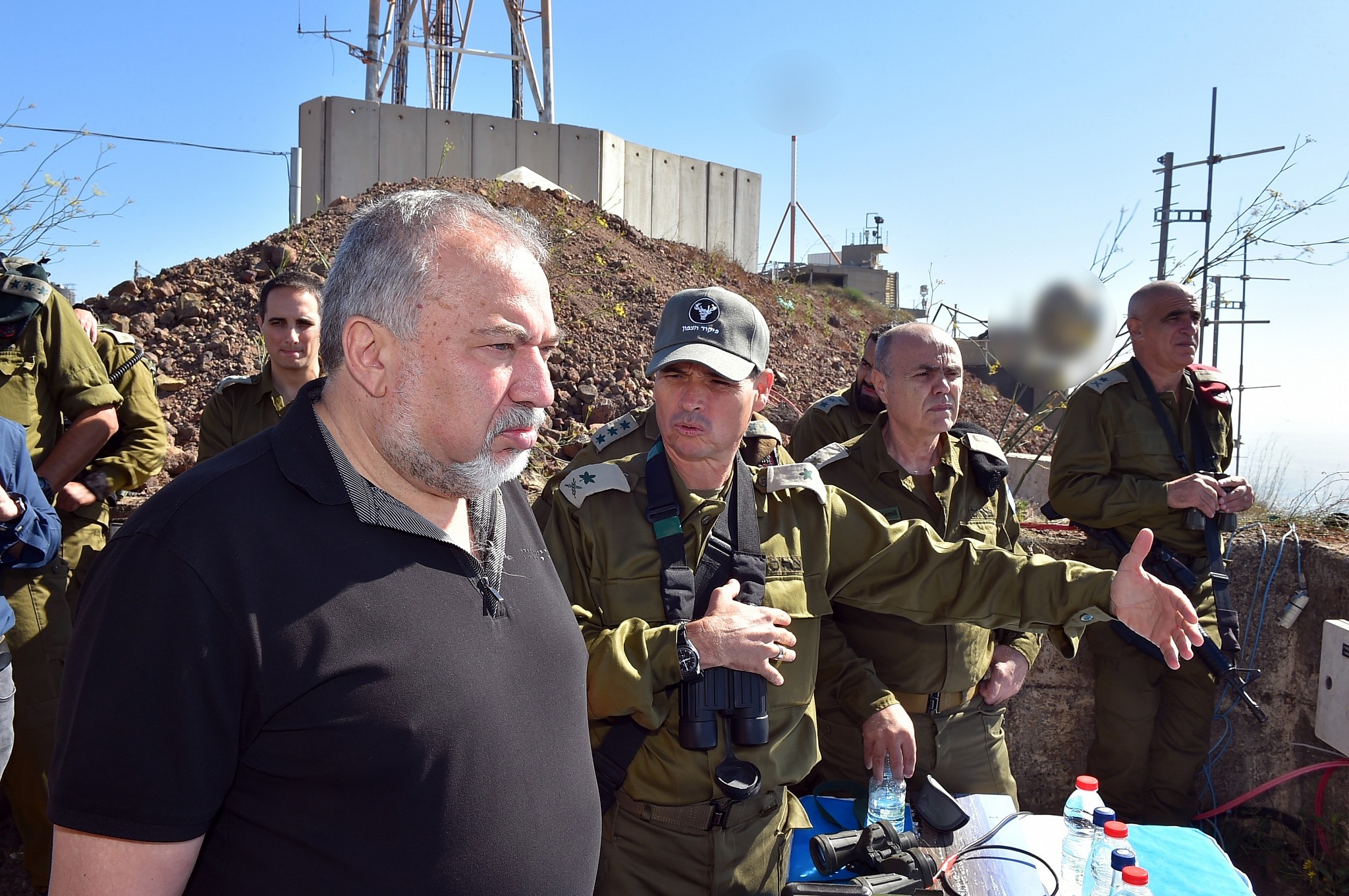
In a short press conference after a tour of the border and meetings with IDF regional commanders, the defense minister also warned Assad’s forces against entering the demilitarized zone along the border with Israel, indicating that those who do so would be attacked.
“In our view, the entry of Syrian forces into the buffer zone — any Syrian soldier who finds himself in the buffer zone is endangering their life,” he said.
Liberman added that Israel was prepared to take action not only against terror groups but also against Assad’s regime, which “is responsible and will bear that responsibility and pay a heavy price for cooperating with members of the axis.”
The defense minister added that Israel was not dismissing out of hand the possibility for some kind of normalization with the Assad regime in the form of opening the Quneitra Crossing between the two countries.
“I believe that we are far from that, but I am not ruling anything out,” he said.
Getting Iran out of Syria
Israel has long stated that it will not allow Iran to set up a permanent military presence in Syria and is prepared to take military action to prevent such a situation.
While Russia does not seem to have accepted Israel’s demand for Iran to be completely removed from Syria, it has agreed to force the Islamic Republic’s forces and proxies to leave the areas closest to the border with Israel. According to some reports, pro-Iranian forces would be required to stay 40 kilometers (25 miles) away from the border; others indicate that range would be set at 80 kilometers (50 miles).
On Tuesday, Liberman reiterated Israel’s opposition to any Iranian military presence in Syria.
“The very fact of Iranian presence in Syria is, in our view, unreasonable. We are not prepared to accept Iranian presence in any part of Syria and, as I’m sure you’ve heard more than once, we will act against Iranian entrenchment in Syria,” he said.
“Regarding a retreat to 40 kilometers or 80 kilometers, it doesn’t matter. Therefore, the moment we see Iranian presence, we take action, and that is how it will continue,” Liberman added.
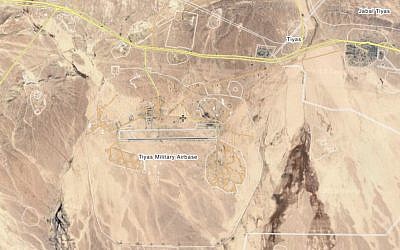
On Sunday night, Syrian state media reported that Israel had launched an airstrike on the T-4 air base in central Syria. The Israeli military would not confirm that it had carried out the strike, sticking to its general policy of not commenting on alleged operations abroad.
Israeli defense officials have said the T-4 base, also known as the Tiyas air base, is used by Iranian forces in Syria. The Israeli military has carried out airstrikes on the facility, which is located between the cities of Homs and Palmyra, on multiple occasions, most notably on February 10 in response to a drone that Israel says was flown into Israeli airspace from the base.
The consequences of Assad’s offensive
On June 19, Assad’s army, aided by the Russian military and Iran-backed Shiite militias, launched a renewed offensive against two rebel-held provinces in southern Syria, Daraa and Quneitra, that has killed over 150 people and displaced over 300,000 civilians, according to local estimates and United Nation figures.
Nearly 200,000 displaced people have fled toward the Israeli border, setting up in camps that lack sufficient tents, food and basic services. Tens of thousands more have flocked toward the Jordanian border.
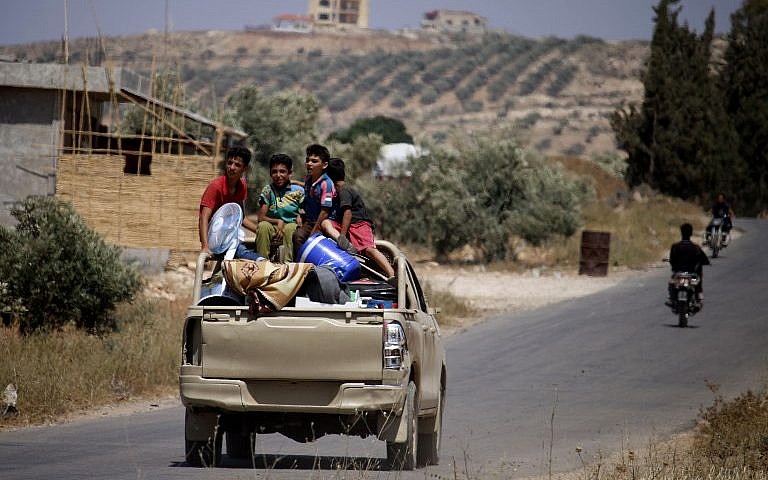
Both Israel and Jordan have stated explicitly that they will not allow refugees into their countries.
Liberman reiterated that position on Tuesday, but added that Israel was “prepared to give all manner of humanitarian aid.”
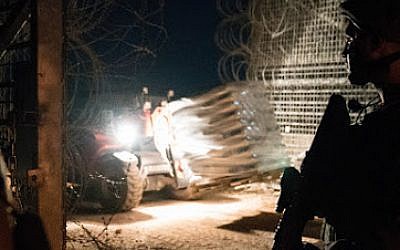
Through an army project known as Operation Good Neighbor, Israel has provided tons of food, baby formula, medical equipment, fuel, clothing and tents to southern Syria since the start of Assad’s offensive.
The defense minister said he hoped that that work will continue even if Assad wrests back control of the country’s southwest from rebel forces, as he is expected to do.
Pressure on Hamas
Turning his attention to the south, the defense minister also discussed the decision on Monday to close the Kerem Shalom Crossing into the Gaza Strip, except to shipments of humanitarian aid, in response to a near-constant stream of incendiary and explosive kites and balloons that have been flown into Israel from the coastal enclave over the past three and a half months. Those arson devices have scorched thousands of acres of land in southern Israel and caused millions of shekels worth of damages.
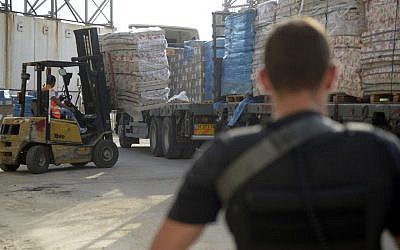
When the measure was announced, Liberman said it was designed to pressure the Gaza-ruling Hamas terror group into forcing Palestinians to stop flying the kites and balloons into Israel. When asked if the closure had yet to yield results, the defense minister said it was too soon to tell.
“This decision was made yesterday, and it is only being implemented today. I hope that the message will be received by the leaders of Hamas and that we will see an immediate end to the arson attempts, the balloons and the other provocations that we’ve seen, not only in the past three months,” he said.